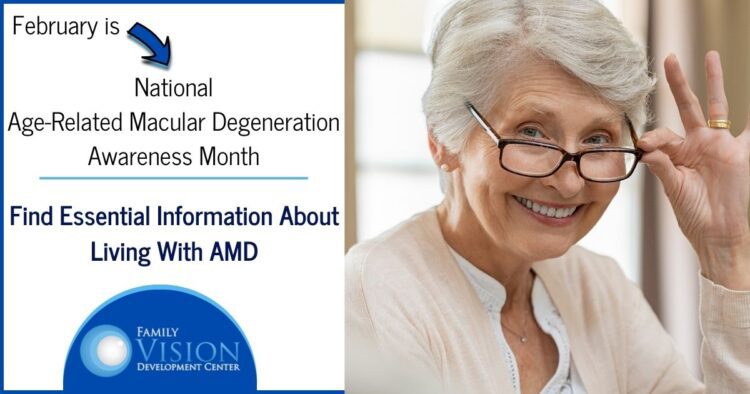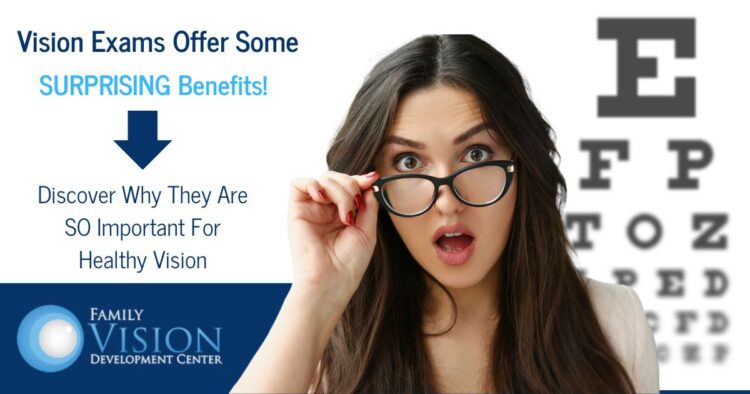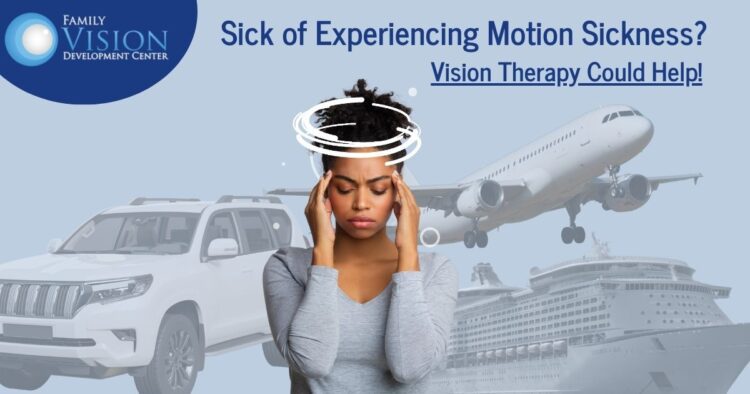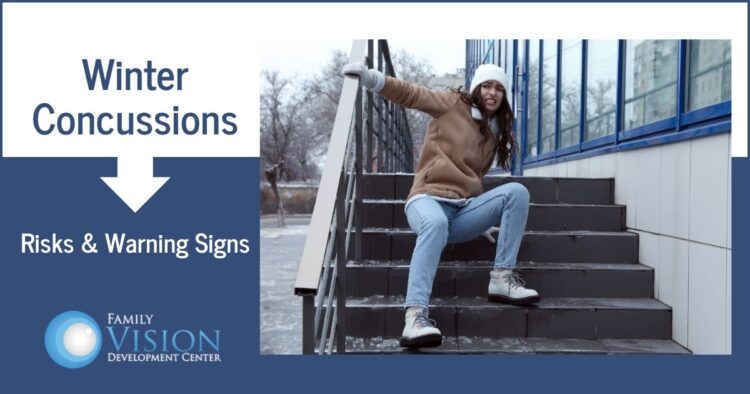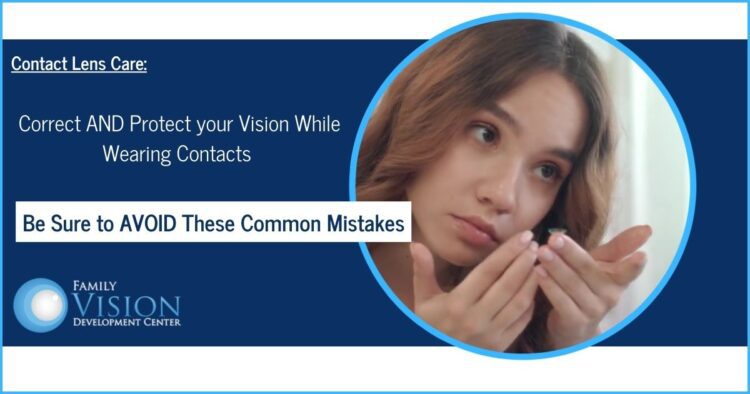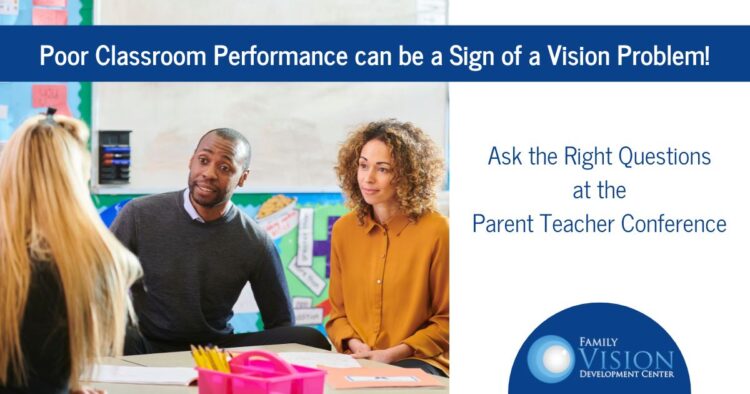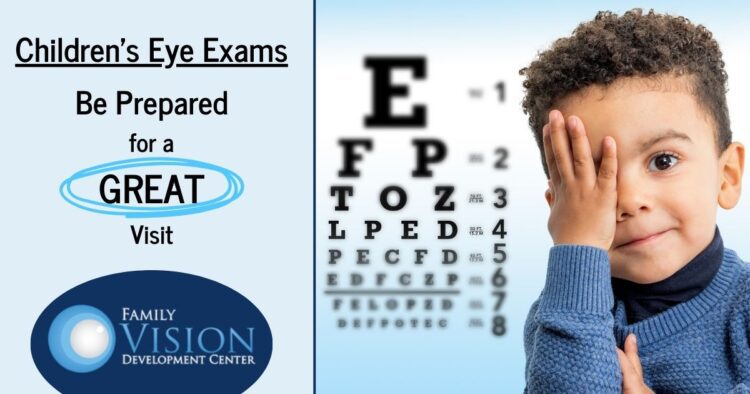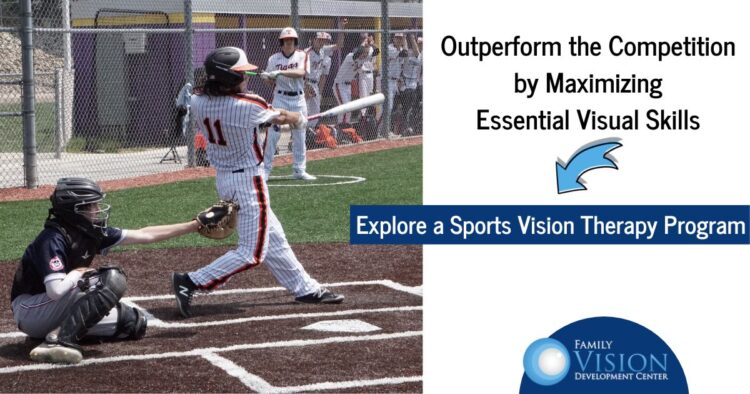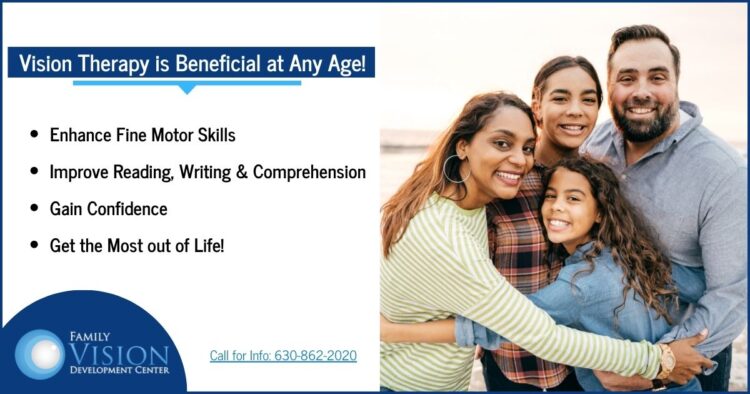February marks National Age-Related Macular Degeneration (AMD) Month, a time dedicated to raising awareness about this prevalent eye condition. At Family Vision Development Center, we believe it’s crucial to inform our patients about AMD, its risk factors, symptoms, and management strategies. Therefore, we would like to share some important information about the basics of AMD and explore how we can assist in managing this condition effectively.
What is Age-Related Macular Degeneration (AMD)?
AMD is a progressive eye disease that affects the macula, the central part of the retina responsible for sharp, central vision. Over time, AMD can lead to blurred or distorted vision, making it challenging to perform tasks such as reading or driving.
Types of AMD
- Dry AMD: This form of AMD is more common, characterized by the gradual breakdown of light-sensitive cells in the macula.
- Wet AMD: Less common but more severe, wet AMD involves the growth of abnormal blood vessels beneath the macula, which can leak blood and fluid, leading to rapid vision loss if left untreated.
Risk Factors for AMD
- Age: AMD primarily affects individuals over the age of 50.
- Family History: Genetics play a significant role in predisposing individuals to AMD.
- Smoking: Tobacco use increases the risk and progression of AMD.
- Obesity: Being overweight or obese is associated with a higher likelihood of developing AMD.
- High Blood Pressure: Hypertension can contribute to the progression of AMD.
- Sun Exposure: Prolonged exposure to ultraviolet (UV) light may increase the risk of AMD.
Symptoms of AMD
- Gradual loss of central vision
- Distorted or blurry vision
- Difficulty reading or recognizing faces
- Increased sensitivity to glare
- Decreased color perception
How Family Vision Development Center Can Help Manage AMD
- Comprehensive Eye Examinations: Regular eye exams are crucial for early detection and monitoring of AMD. During your exam, we will perform various tests, including visual acuity tests, dilated eye exams, and imaging tests, to assess the health of your retina.
- Personalized Treatment Plans: Depending on the type and severity of AMD, we may recommend specific treatments, such as:
- Nutritional supplements containing vitamins and minerals beneficial for eye health.
- Anti-VEGF (vascular endothelial growth factor) injections to inhibit the growth of abnormal blood vessels in wet AMD.
- Low vision aids and devices to help improve visual function and quality of life for individuals with advanced AMD.
Treatment options for both wet and dry AMD are continually changing and improving, such as evolving drug therapies, gene therapy for wet AMD, advancing anti-VEGF treatments, and even stem cell transplants. We stay informed of developments as they become available and work with patients to determine the best course of treatment.
- Lifestyle Modifications: Another way we help our patients is by providing guidance on lifestyle changes that may help manage AMD and reduce its progression. This may include quitting smoking, maintaining a healthy diet rich in antioxidants and omega-3 fatty acids, wearing UV-protective sunglasses, and managing underlying health conditions like hypertension.
- Patient Education and Support: Of course, we will always serve as a valuable resource for educating our patients about AMD, answering questions, and providing support throughout their treatment journey. We do our best to offer advice on adapting daily activities to accommodate changes in vision, and refer patients to support groups or other services if needed.
As we observe National Age-Related Macular Degeneration Month, it’s essential to prioritize eye health and raise awareness about AMD. By understanding the risk factors, symptoms, and management options for AMD, our patients can take proactive steps to preserve their vision. Your eye doctor plays a crucial role in diagnosing, treating, and supporting individuals affected by AMD, so don’t hesitate to contact us at 630-862-2020 to schedule your regular eye exam and seek guidance for optimal eye care.
Family Vision Development Center is a full-service vision center offering innovative vision therapy services, sports vision therapy services, post-concussive vision rehabilitation, comprehensive vision exams for eyeglasses and contact lenses, management of ocular diseases including glaucoma, diabetes, macular degeneration and cataracts, and a state-of-the-art optical center offering the latest designs in eyewear.
Regular comprehensive vision exams may not be on the top of most people’s list of important things to do. But they absolutely should be! In fact, getting your vision examined every year is one of the most important things you can do to protect your overall health and well-being. While we feel that there are dozens of reasons why vision exams are essential, here are a few of the top reasons to visit us for an annual appointment.
Prescriptions Can Change
Vision can change over time, so annual vision exams help ensure that your prescription for glasses or contact lenses is up-to-date. Wearing an outdated prescription not only leads to discomfort, but can also contribute to eye strain, headaches, and can even worsen existing vision problems. Keeping your prescription current ensures that you are seeing the world clearly and comfortably.
Vision Exams Help Track Vision Changes Quickly
Comprehensive vision exams check your vision, the inner and outer parts of your eyes, and measure how well your eyes work together as a team. Even if the exam determines that no corrective measures are needed, the results serve as a baseline for future exams. Consistent vision exams can help us quickly recognize signs of a developing vision disorder, such as glaucoma or macular degeneration, and can allow for early and more effective treatment. In essence, regular vision exams act as proactive checkpoints, enabling us to address vision changes promptly and help you to maintain optimal eye health.
Vision Exams can Reveal Signs of Dangerous Health Problems
Believe it or not, your eyes can provide valuable insights into your overall health. During an eye exam, we may identify signs of systemic health issues such as diabetes, hypertension, and high cholesterol. Changes in the blood vessels, retina, or even the appearance of yellowish deposits in the eye can serve as early indicators of these conditions. Detecting and addressing these issues promptly can have a positive impact on your overall health.
Get Important Vision Questions Answered on a Regular Basis
At Family Vision Development Center, we are always happy to share our wealth of knowledge. We stay informed of the latest eyecare topics, the most current vision therapy treatment options and the latest in eyeglass and contact lens technology. It is important to have a true partner in maintaining your eye health, and we are here to help ensure that you have a reliable source of information when the need arises.
Preserve your Vision on a Long-Term Basis for Overall Quality of Life
Healthy vision is an essential component of daily life. When your vision suffers, everyday tasks can become more difficult. In essence, clear vision is fundamental to our daily activities, from work to leisure. By addressing any vision issues promptly, you can maintain an optimal quality of life. Whether it’s reading a book, driving a car, or enjoying your favorite hobbies, proper vision is important. Yearly vision exams help ensure that you can continue to engage in these activities to the fullest extent possible.
Family Vision Development Center is here to help ensure your complete eye health with comprehensive vision services that range from eyeglasses and contacts to effective vision therapy programs, and even post-concussive visual rehabilitation following a head injury. But it all starts with the vision exams! Contact us today at 630-862-2020 to schedule your appointment and get started on a commitment to healthy vision for life.
Family Vision Development Center is a full-service vision center offering innovative vision therapy services, sports vision therapy services, post-concussive vision rehabilitation, comprehensive vision exams for eyeglasses and contact lenses, management of ocular diseases including glaucoma, diabetes, macular degeneration and cataracts, and a state-of-the-art optical center offering the latest designs in eyewear.
Many people experience motion sickness, and it can be very uncomfortable, annoying and disruptive during daily activities. People who suffer from motion sickness often have difficulty with actions such as reading while riding in a car or plane, travelling by boat, looking at stationary objects while in motion, watching oncoming traffic, watching a 3-D movie or riding an amusement park ride. Symptoms of motion sickness can include:
- Nausea and vomiting
- Dizziness
- Headache
- Fatigue
- Cold sweats
- Rapid breathing
- Increase in saliva production
Motion Sickness Connection to Vision
Motion sickness can occur when there is a disconnection between what the eyes see and the signals the brain receives from the inner ear and other sensory systems. When visual input contradicts the body’s perception of motion, it can lead to a sensory mismatch, triggering symptoms like nausea and dizziness.
For individuals with vision issues, this disconnect becomes more pronounced. Conditions such as strabismus (eye misalignment), amblyopia (lazy eye), or convergence insufficiency (difficulty coordinating both eyes to focus on nearby objects) can disrupt the normal functioning of the visual system. When these conditions are present, the eyes may struggle to work together efficiently, exacerbating the sensory mismatch that contributes to motion sickness.
Vision Therapy for Motion Sickness
Vision therapy is a specialized form of visual rehabilitation that retrains how the eyes and brain communicate with each other. It involves a personalized program of eye exercises and activities designed to enhance eye coordination, tracking, and focus. When it comes to motion sickness, vision therapy can play an important role in addressing the underlying visual issues that can contribute to the condition by accomplishing the following goals:
- Strengthening Eye Muscles – Vision therapy exercises often target the muscles responsible for eye movement and coordination. By engaging in activities that promote the strength and flexibility of these muscles, individuals can enhance their ability to maintain visual focus and reduce strain during motion.
- Improving Eye-Body Coordination – Vision therapy also helps strengthen the connection between the eyes and the body’s movements. Activities that enhance eye-body coordination can help individuals adapt more effectively to changes in their visual environment. This can help reduce the likelihood of experiencing motion sickness.
- Enhancing Depth Perception – Conditions like strabismus can impact depth perception, making it difficult for the eyes to work together in perceiving distances accurately. Vision therapy exercises can improve depth perception, allowing individuals to better judge spatial relationships and reduce the disorienting effects of conflicting visual signals.
- Correcting Convergence Insufficiency – Convergence insufficiency, where the eyes struggle to work together as a team, can contribute to eye strain and discomfort during tasks like reading or focusing on nearby objects. Vision therapy can target these issues, promoting more efficient eye teaming and reducing the likelihood of visual discomfort that may contribute to motion sickness.
Family Vision Development Center for Vision Therapy
The team at Family Vision Development Center has advanced training in vision therapy treatment options. If you find that motion sickness is disrupting your daily activities, come in for a consultation so we can determine the best options for you. Each vision therapy program is individualized according to your specific needs so we can target the exact underlying visual issues with the appropriate exercises. Contact us at 630-862-2020 to learn more about the benefits of vision therapy for eliminating the bothersome effects of motion sickness.
Family Vision Development Center is a full-service vision center offering innovative vision therapy services, sports vision therapy services, post-concussive vision rehabilitation, comprehensive vision exams for eyeglasses and contact lenses, management of ocular diseases including glaucoma, diabetes, macular degeneration and cataracts, and a state-of-the-art optical center offering the latest designs in eyewear.
There are a lot of reasons to enjoy winter. After all, it’s the time of joyous holidays and beautiful, snow-covered landscapes. However, it can also bring an increased risk of concussions and that is something to take seriously. At Family Vision Development Center, our priority is protecting and caring for our patients’ vision. Because the colder months can present their own set of hazards that can lead to head injuries – and those injuries can greatly impact a person’s vision – we feel it is important to make you aware of the potential risks of concussions during this time of year, as well as provide information about what to do following an injury.
Potential Winter Hazards
This winter, be aware of the following risks that can lead to concussions:
- Slippery surfaces – Winter is synonymous with icy sidewalks, snowy driveways, and slippery roads. The increased likelihood of slips and falls on these surfaces raises the risk of head injuries and concussions. Walking outside, even for a moment, can pose a slip-and-fall hazard, as ice may not be clearly visible. And driving can certainly be more dangerous during periods of snow and reduced traction, which can lead to an increased risk of auto accidents.
- Winter Sports – Activities like skiing, snowboarding, and ice hockey are popular winter pastimes, but they also carry an inherent risk of head injuries. Collisions, falls, and abrupt stops common in these sports can result in concussions. It is crucial to wear appropriate protective gear, including helmets, to mitigate these risks.
- Reduced Visibility – Winter weather often brings reduced visibility due to fog, snowfall, or early darkness. Impaired visibility increases the chances of accidents, falls, and collisions, subsequently elevating the risk of concussions.
Visual Concerns Following Concussions
While the immediate symptoms of a concussion often include headaches, dizziness, and confusion, the effects on vision are not always as apparent. Here are some ways concussions can affect vision:
- Eye focusing – not being able to quickly and easily see an object clearly (objects look blurry)
- Eye Movements and Tracking – not able to easily follow a moving object from one spot to another, or switch fixation from one object to another. Sometimes this can be reported by students saying that words are moving on the page.
- Depth Perception Issues – difficulty with accurately judging the distance between objects.
- Eye Teaming – not able to get both eyes to work together to focus on an object, often reported as double vision
- Peripheral Vision Loss – problems with your wide-angle field of vision, or feeling like you’re looking through a narrow tube
In addition to the visual issues mentioned above, any of the following symptoms can be an indicator of a possible concussion:
- Headache
- Nausea or vomiting
- Dizziness or balance problems
- Confusion or forgetfulness
- Loss of consciousness
- Sensitivity to light or noise
- Feeling sluggish, groggy or slowed down
- Mood or personality changes
- A general feeling that something is not right
- Difficulty with sleep
Family Vision for Post-Concussive Visual Rehabilitation
The Family Vision team has specialized training in post-concussive neuro-optometric rehabilitation. We can customize this special type of vision therapy program to target the concussion symptoms you are experiencing in order to restore visual abilities. Those who have experienced a head injury often have difficulty participating in normal, daily activities that once were accomplished easily. It is our passion to help those patients return to their daily lives and continue to pursue their interests. Contact us at 630-862-2020 to get more information or to schedule a consultation.
Family Vision Development Center is a full-service vision center offering innovative vision therapy services, sports vision therapy services, post-concussive vision rehabilitation, comprehensive vision exams for eyeglasses and contact lenses, management of ocular diseases including glaucoma, diabetes, macular degeneration and cataracts, and a state-of-the-art optical center offering the latest designs in eyewear.
As winter weather quickly approaches, it is important to be prepared for a unique visual challenge that often accompanies snow-covered landscapes – glare. While a winter wonderland can certainly be beautiful, the reflective nature of snow intensifies sunlight, causing a brightness that can significantly impact our vision.
How Glare Affects Vision
Winter glare occurs due to the reflective properties of snow and ice. When sunlight hits the white surface, it bounces back, creating an amplified intensity that can overwhelm the eyes. This is known as snow blindness, or photokeratitis, and can cause an increased risk of eye damage. Snow blindness occurs when UV light enters the cornea of the eye, inflaming the epithelium. When agitated, this sensitive outer layer becomes irritated and inflamed, resulting in a variety of symptoms. Some of these symptoms include:
- Photophobia or light sensitivity
- Painful burning sensation in the eyes
- Visible redness in the eyes
- Excessing tearing or watering
- Blurred vision
- Swollen eyes or eyelids
- Headaches
- Halo effects around light sources
Prepare for Glare in these Situations
Winter glare can present itself in a variety of situations so be prepared while:
Driving – drivers can experience glare from snowy surroundings, as well as frozen surfaces such as ice-covered roads and sidewalks or bodies of water. Additionally, because of the sun’s relative position to Earth in winter, the sun’s rays hit Earth at a lower angle. This can cause increased glare on the roads, which can create dangerous driving conditions especially during the early morning or late afternoon hours.
Participating in Winter Sports – many people enjoy the sporting activities available in winter months, such as skiing, snowboarding or snowmobiling. But these activities obviously involve being in or around a lot of snow, so it is important to remember the damage that glare can cause and take the appropriate precautions.
Shoveling – Although not usually a favorite winter activity, shoveling snow is often a necessity for many people. Oftentimes, people will be out tackling their snow-covered driveways in the morning, before heading out to work or school. This is prime time for the sun’s rays to reflect off snow or ice-covered surfaces, causing potential eye damage.
One Surefire Solution to Prevent Glare
The easiest and most effective way to prevent glare this winter is to wear protective eyewear! Although it might sound like a simple solution, many people go out every day without any type of protection for their eyes. But wearing a good pair of sunglasses can be crucial to preventing damage. When selecting sunglasses, always make sure that they block 100% of the sun’s UV-A and UV-B rays. Glare that reflects off of snow or ice can intensify UV exposure, but high-quality sunglasses can offer much-needed protection. Additionally, polarized sunglasses offer a very effective way to reduce glare and will significantly increase your ability to see clearly during bright conditions.
Protective eyewear can come in different forms. For example, sunglasses should be worn every time you go outside. In fact, keeping an extra pair in the car can ensure that you have them when you need them and provide safety while driving at any time of day. Wearing sports goggles while engaging in outdoor winter activities will protect your eyes from glare, as well as any flying ice particles that could damage your eyes. Additionally, prescription eyeglasses can be customized with glare-reducing coatings to provide additional daily protection from glare.
The team at Family Vision Development Center is dedicated to your healthy vision! Our extensive optical center has a variety of glasses and sunglasses that can help prevent harmful glare in your daily life. Contact us at 630-862-2020 to schedule a visit for a vision exam or for a consultation in our optical center.
Family Vision Development Center is a full-service vision center offering innovative vision therapy services, sports vision therapy services, post-concussive vision rehabilitation, comprehensive vision exams for eyeglasses and contact lenses, management of ocular diseases including glaucoma, diabetes, macular degeneration and cataracts, and a state-of-the-art optical center offering the latest designs in eyewear.
Contact lenses are a popular choice for vision correction due to their convenience and unobtrusive nature. However, while they offer freedom from the constraints of traditional eyeglasses, contact lenses require a higher level of care and attention. Unfortunately, many people underestimate the importance of proper contact lens care, which can lead to a number of complications that can affect their eye health. Understanding and avoiding these common mistakes associated with contact lens usage is essential in order to maintain healthy eyes and enjoy the benefits of clear vision.
Sleeping in Contact Lenses
Sleeping in contact lenses is a common oversight that significantly increases the risk of eye infections and corneal complications. The closed-eye environment during sleep can promote the accumulation of bacteria and can reduce oxygen supply to the cornea, which can lead to discomfort, inflammation, or potential long-term damage. Unless your contacts are specifically designed for extended wear, always take them out before sleeping, even if you are just taking a nap.
Neglecting Proper Hygiene
Failing to maintain proper hygiene while handling contact lenses can introduce harmful bacteria and debris to the eyes. Poor hand washing, using saliva to moisten lenses, and ignoring lens case cleanliness are common habits that can lead to severe eye infections and discomfort. Practicing good hygiene is vital to ensure the safety and effectiveness of contact lens use.
Using Tap Water for Cleaning or Storing Contact Lenses
Some individuals resort to using tap water as a substitute for the recommended contact lens solution, not realizing that it contains microorganisms that can adhere to the lenses and cause infections. Tap water may also contain chemicals and impurities that can damage the lenses, leading to discomfort and reduced clarity of vision. To reduce the risk of infection, it is best to keep contacts away from any kind of water.
Failing to Replace Lenses on Time
Overextending the lifespan of contact lenses beyond their recommended usage period can compromise their integrity and lead to discomfort, decreased vision quality, and increased risk of eye infections. This is why it is so important to regularly replace lenses according to our advice during your exam, in order to maintain optimal eye health and visual acuity.
Ignoring Symptoms of Discomfort
When it comes to wearing contact lenses, it is important to pay attention to signs of a potential problem, such as redness, dryness, irritation or pain. Ignoring these symptoms can allow underlying eye issues to worsen, and potentially lead to severe complications. You can’t be too careful with your vision, so if you have any concerns at all about a possible issue with your contacts, always come to see us for an evaluation.
At Family Vision Development Center, our dedicated team will make sure you have the right contact lenses to properly correct your vision. And just as importantly, we will make sure you understand the responsibilities involved in order to protect your eye health. Contact us at 630-862-2020 to schedule your appointment for a vision exam, consultation and to get all of your important questions answered.
Family Vision Development Center is a full-service vision center offering innovative vision therapy services, sports vision therapy services, post-concussive vision rehabilitation, comprehensive vision exams for eyeglasses and contact lenses, management of ocular diseases including glaucoma, diabetes, macular degeneration and cataracts, and a state-of-the-art optical center offering the latest designs in eyewear. We are dedicated to keeping our patients comfortable and well-informed and we will explain every exam and procedure and answer all of your questions. We accept both scheduled and emergency appointments, and offer convenient financing and insurance options to ensure that high-quality vision care is available and affordable to all of our patients.
November is typically the time of year that schools allow parents the opportunity to meet individually with their child’s teacher in order to assess their progress and discuss any issues before getting too far into the school year. As the teacher explains your child’s behaviors in the classroom, interactions with other students, punctuality with homework assignments and more, make sure to listen closely. If you hear the teacher mention any of the following issues, it could be a sign of an underlying vision condition.
Classroom Clues that can Indicate a Vision Issue
- Reading problems – a vision disorder can cause a child to transpose letters, confuse similar letters or words, skip lines or words while reading, or lose their place easily. Additionally, vision conditions often cause blurry or double vision. Any of these issues could obviously make reading extremely challenging.
- Avoids doing homework – if a student has a vision condition, it can be very difficult to complete visually demanding tasks. Therefore, they may lose interest or give up trying to complete assignments.
- Messy handwriting – Children with vision problems may have poor eye movement skills or poor visualization abilities. The lack of these necessary skills could prevent a child from being successful at writing.
- Sits too close to the board, computer screen or reading materials – when a student consistently positions himself or herself very close to things they need to read, it might mean they cannot see clearly from a distance. This can affect classroom performance when important information is outside of their clear field of vision.
- Poor behavior in the classroom – when a student cannot maintain focus, they may begin to act out. But many students are misdiagnosed with ADHD, when binocular vision disorders actually have similar symptoms. In fact, functional vision problems often mimic ADHD symptoms, such as difficulty focusing, fidgeting in their seat or making careless mistakes. Any child facing an ADHD diagnosis should also be examined for a binocular vision problem.
Additional Questions to ask the Teacher
Along with discussing classroom performance, it’s a good idea to also question any unusual frequent behaviors by your child. The teacher interacts with your child on a daily basis so ask if they notice any of the following occurring consistently throughout the day. While these issues may not directly affect their academic performance, they can be signs of a possible vision issue:
- Excessive rubbing of their eyes
- Abnormal head tilting or turning
- Often complains of headaches
- Sensitivity to light
- Poor hand-eye coordination
- Frequently bumps into things
Explore the Possibility of a Binocular Vision Disorder
A teacher may be quick to assume that a child has a problem with learning new material, has a behavior issue, is not interested in participating or does not have the capability to succeed in school. However, this could be because they have not been trained to watch for signs of an underlying binocular vision condition. Correcting a binocular vision disorder can be just what your child needs to experience school in a whole new way and enjoy the success they truly want!
When you bring your child in to Family Vision Development Center for a comprehensive vision exam, we will thoroughly evaluate and diagnose any vision issues that could be affecting your child’s school performance. Additionally, we offer many ways to effectively treat the common binocular vision disorders that can cause classroom struggles. In fact, our doctors have extensive training in the latest vision therapy techniques that can vastly improve your child’s visual skills. Contact us at 630-862-2020 to schedule your appointment and set your child on a path to success.
Family Vision Development Center is a full-service vision center offering innovative vision therapy services, sports vision therapy services, post-concussive vision rehabilitation, comprehensive vision exams for eyeglasses and contact lenses, management of ocular diseases including glaucoma, diabetes, macular degeneration and cataracts, and a state-of-the-art optical center offering the latest designs in eyewear.
Vision plays an essential role in our overall well-being. Therefore, taking care of that vision should be a high priority, especially for parents. A child’s eye exam can be a scary event for both the child and the parent if you don’t know what to expect. But the team at Family Vision Development Center is here to assure you that there is nothing to be concerned about! Regular vision exams are the best way to maintain your child’s healthy vision and we are committed to making the process as easy as possible.
When to Bring your Child in for a Visit
The American Optometric Association (AOA) recommends that infants have their first comprehensive eye exam at 6 months old. Moving forward, they should return at age 3, then again at age 5 or 6 when the child starts first grade. School-aged children should have an eye exam every two years if no vision correction is required. If a child needs corrective glasses or contact lenses, it is recommended that they get an exam every year in order to ensure proper vision correction. Following these guidelines is an important way to allow for quick diagnosis and treatment of any potential vision concerns.
What to Expect at your Child’s Eye Exam
When you bring your child to Family Vision Development Center, you can expect that we will provide a comfortable environment where your child feels safe and welcome! This exam is where we collect all of the necessary information and testing to determine the health of your child’s eyes and if any vision correction is required.
During this assessment, we will gather information about your child’s medical history, and will perform tests to determine how well the eyes are functioning and to check for signs of eye problems such as amblyopia, eye misalignment, convergence insufficiency, poor depth perception or focusing issues. Some of the tests we might perform during your child’s eye exam include:
- Visual acuity test – we assess visual clarity by having the child identify letters or pictures of varying sizes
- Refraction test – this helps us determine if your child needs glasses or contact lenses
- Pupil test – we quickly flash a light into each eye to see how the pupil responds
- Eye movement test – here we assess how well your child’s eyes align and move together, which is crucial for proper depth perception and coordination
How to Best Prepare for your Child’s Eye Exam
A child’s eye exam can go more smoothly if you are prepared! Here are some easy tips to make the visit easier for you and your child:
- Schedule the appointment properly – when choosing a time, make sure that it fits well with your child’s schedule. For example, try not to schedule a time when they would normally be napping or during a time when they are typically tired or cranky. Happy kids make for easier appointments!
- Bring appropriate items with – before heading out to the exam, check to make sure you have all important information, such as your child’s and family medical history, previous prescription information, as well as your current insurance information. The more organized you are, the less likely the chance of delays.
- Talk to your child before you go – much of the nervousness from kids comes because they do not know what to expect. They will be much more at ease if you explain to them that the doctor will look at their eyes, ask some questions and do a few tests. But the tests are not painful and the team is very nice so there is nothing for them to be afraid of.
- Bring a few small toys or their favorite stuffed animal – we always try to stay on schedule, but in the event of an emergency there may be an unexpected wait. In those cases, it’s best to have something to keep your child occupied while they wait. And having a comfort item like a blanket or animal can help calm their nerves during the exam.
- Stay calm and supportive – as much as you prepare a child, it is still normal for them to be apprehensive during their visit. Simply giving them words of encouragement about the great job they are doing can go a long way in helping them to stay calm throughout the visit.
- Plan a post-visit treat – kids love rewards! Consider planning a fun activity or treat for your child after the exam to give them something to look forward to and to make the experience more enjoyable.
Keep in mind that we are here to help make your visit as easy as possible. We take great pride in the care that we provide to our young patients and want to provide them a lifetime of healthy vision! Contact us at 630-862-2020 to schedule your appointment or to ask any additional questions.
Family Vision Development Center is a full-service vision center offering innovative vision therapy services, sports vision therapy services, post-concussive vision rehabilitation, comprehensive vision exams for eyeglasses and contact lenses, management of ocular diseases including glaucoma, diabetes, macular degeneration and cataracts, and a state-of-the-art optical center offering the latest designs in eyewear. We are dedicated to keeping our patients comfortable and well-informed and we will explain every exam and procedure and answer all of your questions. We accept both scheduled and emergency appointments, and offer convenient financing and insurance options to ensure that high-quality vision care is available and affordable to all of our patients.
Sports vision therapy is a personalized form of vision therapy that is used to develop or enhance specific visual skills in athletes. Just like any other physical skill, an athlete’s visual skills can be improved through proper training. A custom sports vision therapy program can be just the solution an athlete needs to outperform their competition or solidify their place on a team.
Benefits of Sports Vision Therapy
Many athletes have the necessary basic skills to play their game, such as strength, speed and endurance. However, high-performing athletes go above and beyond, often because of their exceptional visual processing skills. This is why those who want to excel often turn to sports vision therapy to rise above and take their game to the next level. Sports vision therapy can help athletes improve their performance in a variety of ways, including:
- Improved hand-eye coordination: Hand-eye coordination is the ability to coordinate the movement of the eyes with the movement of the hands. Many sports require precise hand-eye coordination, and sports vision therapy can enhance this skill, helping athletes catch, throw or hit a ball with greater accuracy.
- Improved depth perception: Depth perception is the ability to judge the distance of objects from oneself. Accurate depth perception is vital in sports where athletes must judge the distance between themselves and the ball or other players. Refining depth perception reduces the likelihood of misjudging distances and making costly errors on the field or court.
- Improved visual processing speed for faster reaction times: Visual processing speed is the ability to process visual information quickly and accurately. Sports vision therapy helps athletes process visual information more quickly and respond accordingly. This can make all the difference in sports where split-second reaction times are essential.
- Enhanced Visual Acuity: Visual acuity is the clarity or sharpness of vision at a distance. Sports vision therapy can sharpen an athlete’s vision, improving their ability to see fine details. This skill is crucial for many sports where precision is essential. Better visual acuity also allows athletes to spot movements and objects more quickly, giving them an advantage in fast-moving sports like soccer or basketball.
Sports Vision Therapy Can Help for Your Sport
Each sport requires its own set of athletic skills in order to excel. Therefore, an athlete can improve their chance of success by working on those visual skills and abilities that are used most often during their gameplay.
- Basketball players often use sports vision therapy to improve shooting or passing skills
- Football players use this training for recognizing defensive coverage, expanding peripheral awareness and for receiving drills
- Baseball players can use this therapy to improve their hitting and fielding skills, recognize pitches more quickly or to improve catching reaction times.
- Soccer players can improve their dribbling and shooting skills, while goalkeepers can train their reaction time, peripheral awareness and decision-making.
- Hockey players can improve their game by enhancing the essential skills used on the ice, such as depth perception, reaction times and focusing ability.
- Golfers can enhance their depth perception in order to accurately assess distance to the hole and club selection, as well as hand-eye coordination to improve their swing and putting ability.
- Tennis players can see similar benefits, with improved focus, visual tracking and depth perception in order to maintain control of a small, fast-moving ball as well as maintain proper position on the court.
Family Vision Development Center Provides Highly Specialized Sports Vision Therapy
At Family Vision Development Center, we have advanced training in sports vision therapy techniques that allow us to help athletes fine tune the essential skills they need to succeed in their sport. First, we assess each athlete to determine the areas of improvement that are needed. Then, we develop a customized visual therapy program to enhance their specific visual skills and improve their athletic performance. We work with athletes of all ages and are dedicated to helping athletes reach their full potential. Contact us at 630-862-2020 to schedule your appointment to learn more about this type of visual training.
Family Vision Development Center is a full-service vision center offering innovative vision therapy services, sports vision therapy services, post-concussive vision rehabilitation, comprehensive vision exams for eyeglasses and contact lenses, management of ocular diseases including glaucoma, diabetes, macular degeneration and cataracts, and a state-of-the-art optical center offering the latest designs in eyewear.
Vision plays such an important role in our everyday lives. So for those who experience vision difficulties, proper treatment can have a significant impact on their overall quality of life. Vision therapy is a very effective option for restoring proper visual function. However, many people believe that only young kids can benefit from the treatment. But that is not true! Vision therapy programs are tailored to meet the individual needs of each patient, and therefore can provide important benefits at any age.
Vision Therapy in Elementary School – Laying the Foundation for Learning
For children in elementary school, vision plays a critical role in their education and overall development. During this stage, they are learning to read, write, and grasp fundamental concepts that they will use for the rest of their lives. Vision therapy can be very beneficial for children in this age group by helping in the following areas:
- Improve School Performance – Vision therapy can help identify and address vision problems that may be affecting a child’s ability to read and write effectively. Conditions like convergence insufficiency (difficulty focusing on close objects) or tracking problems (difficulty following lines of text) can be treated through vision therapy. By improving these visual skills, children can perform better in school.
- Enhance Visual Skills – Vision therapy not only corrects vision problems but also enhances visual skills. For instance, it can improve eye-hand coordination, which is important for activities like handwriting, catching a ball, or playing musical instruments. These skills are essential for a child’s physical and cognitive development.
- Boost Confidence – Struggling with visual issues in elementary school can affect a child’s self-esteem and willingness to participate in class. Vision therapy can boost their confidence by addressing these challenges and helping them feel more comfortable in academic settings.
Vision Therapy in High School – Preparing for Success
As students get to high school, they often face greater academic challenges that require more complex visual skills. Additionally, this is the time that many students begin preparing for higher education opportunities or greater athletic goals. A vision therapy program at this age can help with:
- Reading and Studying – High school students are faced with more extensive reading assignments and the need to study for important exams. Vision therapy can help improve reading fluency, comprehension, and the ability to sustain attention while studying.
- Reducing Eye Strain Symptoms – With the rise in screen time, many high school students experience digital eye strain. Vision therapy can teach techniques to reduce eye fatigue and discomfort, promoting healthier screen habits.
- Athletic Performance – High school sports can be very competitive and students are often trying to prepare for athletic scholarships. Vision therapy can help athletes develop and strengthen visual skills such as hand-eye coordination, tracking and reaction time in order to give them an edge over their competition.
Vision Therapy for Adults – Improving Quality of Life
It’s never too late to improve your vision, so adults should be happy to know that vision therapy programs have many benefits at this age as well.
- Workplace performance – refined visual skills are needed for many aspects of a job, such as fine-detail work, computer work and presentations. Vision therapy can help improve reading and writing ability, concentration, as well as the ability to shift visual focus from close up to farther distances. These improvements can increase performance and productivity and reduce stress.
- Driving Ability – The ability to drive safely is crucial, especially as you age. Vision therapy can address issues like poor night vision, glare sensitivity, or difficulties with depth perception, enhancing road safety.
- Reduce Headaches – more than 15% of adults experience severe headaches or migraines. Both of these are common symptoms of a binocular vision problem (a condition in which the eyes don’t align properly). An adult vision therapy program can improve the communication between the eyes and brain, correct the binocular vision disorder and alleviate the headaches.
Family Vision Development Center is a Vision Therapy Specialist
The team at Family Vision Development Center has advanced training in a variety of effective vision therapy programs. After a comprehensive evaluation, we will custom tailor a program to meet your individual needs. We take pride in our one-on-one approach to vision improvement, and understand the significant impact that restoring or enhancing visual skills can have on the overall quality of life for our patients. Contact us at 630-862-2020 to learn more or to schedule an appointment today.
Family Vision Development Center is a full-service vision center offering innovative vision therapy services, post-concussive vision rehabilitation, comprehensive vision exams for eyeglasses and contact lenses, management of ocular diseases including glaucoma, diabetes, macular degeneration and cataracts, and a state-of-the-art optical center offering the latest designs in eyewear.
